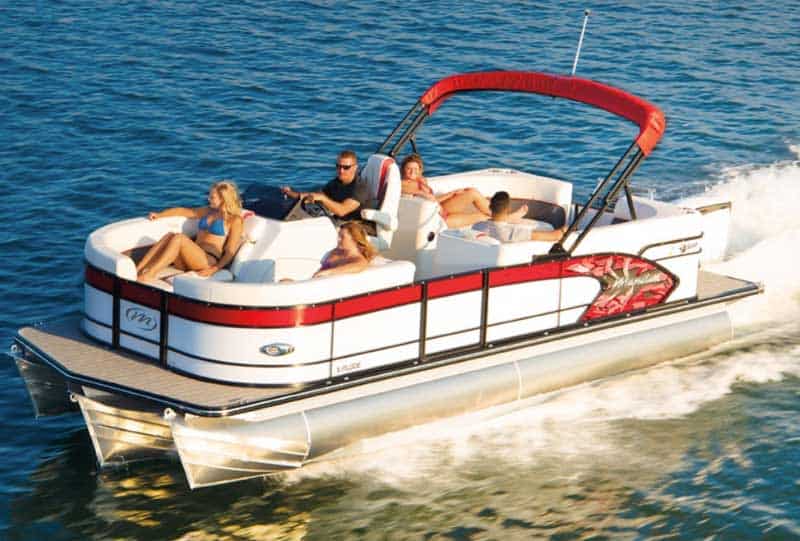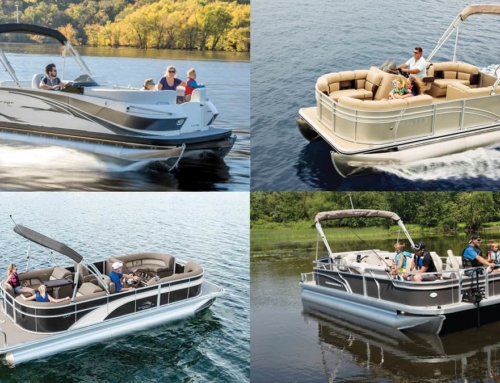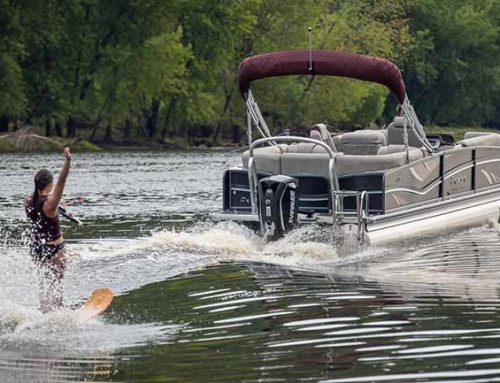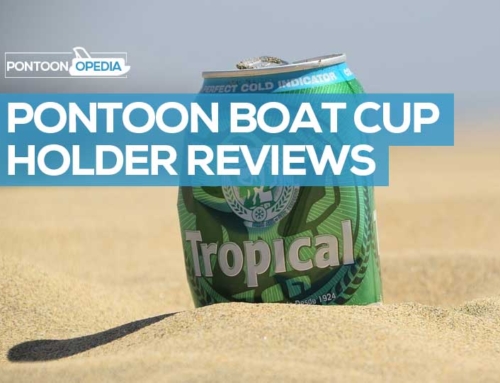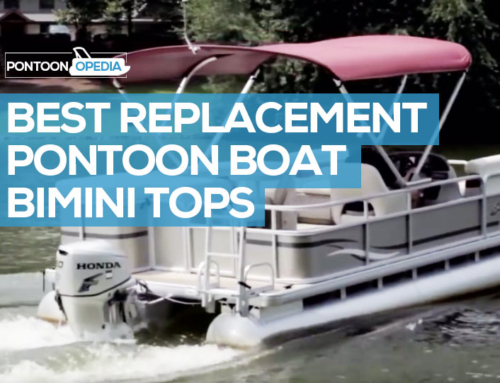If you’re in the decision-making process for buying a pontoon, then speed could be a factor. Bear in mind though that they aren’t really designed for speed, more so for leisure, fun, and fishing. But that’s not to say you can’t buy a fast boat.
In this guide you can find out about the average pontoon boat speed for various different brands, models, and types, plus see just how fast a pontoon boat can go with some awesome examples – one of which actually hit over 100 miles per hour!
Table of Contents
How Fast Can a Pontoon Boat Go? + Speed Chart
There are a few considerations here. Firstly, the classic pontoon boat that you see on a lake or river will probably have a top speed of between 18 to 25 miles per hour. But… you can buy high performance pontoons (and tritoons) that can go that much, much faster.
Here is a pontoon boat speed chart below, which shows some examples of just how fast a pontoon boat will go… and these are boats you can actually buy.
| Pontoon Type | Pontoon Length | Horsepower | Top Speed |
|---|---|---|---|
| Bass Buggy | 18 feet | 60 hp | 17 mph |
| Bass Buggy | 20 feet | 60 hp | 18 mph |
| Sweetwater | 24 feet | 90 hp | 18 mph |
| Sweetwater | 24 feet | 115 hp | 21 mph |
| Gigantic | 30 feet | 115 hp | 21 mph |
| Suntracker | 22 feet | 70 hp | 21 mph |
| Starcraft | 20 feet | 23 mph | 23 mph |
| Party Barge | 18 feet | 75 hp | 24 mph |
| Suntracker | 22 feet | 115 hp | 25 mph |
| Tritoon | 21 feet | 90 hp | 27 mph |
| Tritoon | 21 feet | 90 hp | 27 mph |
| Crest III | 26 feet | 90 hp | 28 mph |
| Tritoon | 26 feet | 175 hp | 35 mph |
| Berkshire Sport RFX9 | 25 feet | 300 hp | 50 mph |
| Bennington QR27 | 28 feet | 250 hp | 51 mph |
| Premier Pontoons 290 | 29 feet | 600 hp | 52 mph |
| South Bay Super Sport 925 | 27 feet | 600 hp | 57 mph |
| Manitou 25 X-Plode XT SHP | 26 feet | 300 hp | 62 mph |
| Harris Crowne SL 250 | 27 feet | 350 hp | 63 mph |
| PlayCraft X-Treme 3110 | 31 feet | 400 hp | 65 mph |
Please note, the ones you see in the pontoon boat speed chart above where they have speeds in excess of 50 miles per hour are special (and very expensive) high performance boats that can cost upwards of $170,000.
The ones where they range from 17 to 28 miles per hour are the classic pontoons you will see on the water most of the time.
How Fast Will a 115 HP Pontoon Boat Go?
One of the more commonly asked questions about pontoon boat speeds, is how fast will a 155 HP pontoon boat go? That’s understandable, as a 115 hp engine is quite a popular engine size.
Despite having a 115-horsepower motor, there will be some other factors that come into play when talking about speed. In the main it relates to how much weight you have on board the boat.
Here are some typical examples of pontoons with a 115hp motor, and how fast they can go depending on the load including passengers and equipment.
- G3 Suncatcher 22-foot V22RF with a 115 hp engine and a medium load will be able to get to around 25 miles per hour.
- With 11 people in the boat (which is the maximum capacity) and a 115hp engine, it should reach around 22 miles per hour.
- Gigantic 30′ pontoon boat with a 115 hp might be able to hit speeds of 15 miles per hour.
- A standard 24-foot pontoon boat with a 115 hp engine and a medium load should be able to get to speeds of 25 miles per hour.
How Fast is a Pontoon Boat for Water Sports?
Most people are buying a pontoon for the leisure aspects, with water sports being a massive consideration. If you want to pull skier and tubes, then speed is probably at the forefront of your mind.
Despite what you might think, the pontoon boat speed doesn’t have to be excessive to do these types of fun activities. Here are just some examples of how fast you will need to go in order to do some of the more common water sports.
- Water-skiing on two skis: 15 to 26 miles per hour
- Pulling inflatable tubes with kids from 4 to 6 years old: 5 to 10 miles per hour
- Pulling inflatable tubes with kids from 8 to 10 years old: 15 to 20 miles per hour
- Pulling inflatable tubes with teenagers and adults: 25 miles per hour maximum
- Wakeboarding: 13 to 18 miles per hour
- Slalom Skiing: 22 miles per hour
- Kneeboarding: 13 to 20 miles per hour
- Barefoot Water-skiing: Read this formula to know how fast you need to go
That will give you a great indication on what speed pontoon you are going to need to buy, with the average speeds required for water sports being around 22 miles per hour.
That top speed is very average for most production pontoons, but there are some high performance models available to buy for massive amounts of money which you can see the top 7 of below.
- Berkshire Sport RFX9 3.0+: 50 miles per hour
- Bennington QR27 10 Wide: 51.3 miles per hour
- Premier Pontoons 290: 52.8 miles per hour
- South Bay Super Sport 925: 57.3 miles per hour
- Manitou 25 X-Plode XT SHP: 62.8 miles per hour
- Harris Crowne SL 250: 63 miles per hour
- PlayCraft Powertoon X-Treme 3110: 65 miles per hour
Handy Hint: For more details on these super fast boats above including how much they cost, take a look at the top 7 list of production pontoons that dealers can sell.
Even if you just have a 90 hp motor, you should be able to hit those types of speeds, although you might need to drop some passengers off at shore before pulling.
How fast will a 115 hp pontoon boat go has been discussed a little further up the page, and you could probably get away with a heavier passenger load during water sports and the higher speeds required.
How to Make a Pontoon Boat Faster
Pontoon boats don’t have to be slow, and there are ways in which you can make them faster which I will come onto later down this guide.
But one of the more popular approach to speeding up a pontoon boat is to add a third tube underneath the deck, which converts the pontoon to a tritoon.
The third tube makes the boat more stable and lets it go faster – read more about the differences between a pontoon and tritoon elsewhere on Pontoonopedia.
That’s quite an expensive modification, which is why most buyers will opt for a production-make tritoon, rather than paying for this additional tube to be added to an existing boat.
Other aspects you can add (or remove) from the boat to make it quicker include:
- Fitting a secondary engine
- Pay for underskinning of the pontoon (find out how)
- Reduce the load inside of the boat
- Swap out some heavy materials for lighter materials
- Ensure that the underside and tubes are clean of debris
- Reduce drag and resistance (for example, the Bimini)
Speed Measurement Methods
You can and should use GPS, radar, and, of course, speedometers to understand the speed of the pontoon boat. But you may not know that by using all three methods, you can get a much more accurate speed reading as they each have their own limitations.
- GPS: You may be surprised to learn that GPS machines often track your speed better than a speedometer! However, sometimes they show the current speed as slightly faster than it actually is.
- Radar: Although not all boat owners invest in radar, it really is an incredible device. Not only is it the most reliable technology for collision avoidance, but it can also accurately measure speed to the exact MPH.
- Speedometers: All pontoon boats should have speedometers. But did you know that they can be wildly incorrect? Though they are the most commonly used, speedometers are the least reliable form of speed measurement.
If you have only been using your speedometer to track your boat’s speed, I recommend taking the time to compare it to your GPS and radar if you have one.
Pontoon Boat Speed Factors
Let’s get into a few of those factors in a little bit more detail. The following elements will affect how fast your pontoon boat goes. With a little modification and change of habit, you could make yours go faster.
Weight & Load
Every boat is different, but what can do here is apply a very broad generalization on how weight and load can affect your speed.
If you add a thousand pounds of weight to your pontoon with passengers and gear, then you could expect to lose 15% of your speed.
For a real-world example of that broad formula in action, if you have a 22 foot pontoon with no passengers or equipment on board, and you can hit 29 miles per hour, that’s a good speed for most people.
If you then add more passengers and gear onto the deck to a total of 1,000 pounds, your pontoon boat speed could then reduce down to 24.5 miles per hour.
Bimini Resistance
All pontooners love to have a Bimini. It offers great protection from the sun, not to mention a little privacy when combined with a pop-up changing room. But will effect how fast your pontoon goes.
On Facebook recently a pontooner conduced an experiment, recording his speed with a GPS app on his smartphone. He found that by folding down his Bimini his top speed increased from 32 to 36 miles per hour. That’s quite an impressive improvement.
Me personally, I’ve never had those improvements myself, so can only assume he was testing speeds on a day with zero wind resistance. The best improvement I have had once taking down the Bimini was around 1 mile per hour. Not as impressive, but still an improvement!
Other items you might want to remove if speed is important is things such as fishing rod holders, a rail-mounted grill (click here for my top grill recommendations), cooler boxes and live wells… in fact, anything that could provide resistance when looking to go faster.
Propeller
Most new boats come with a safe prop and nothing too fancy, unless you have asked the dealer for an upgrade. Safe props are designed to operate under easy and typical conditions.
Many boat owners will upgrade over time themselves and buy a smaller prop that provides increased revs per minute. By changing out the propeller for one that pushes higher RPMs, you can get faster speeds depending on the recommended range of your pontoon motor.
Dirty Tubes
Every boat owner is going to get algae, scum, and some kind of barnacle attaching to their pontoon tubes over time. It’s par the course for pontoon boat ownership.
But did you know this can slow down your boat?
Because of that it pays to clean your tubes regularly, and I have put together a handy guide for algae removal which I recommend you read.
By having clean and polished pontoons, you might increase to faster speeds of between 2 and 6 miles per hour.
Handy Hint: Read additional tips on how to make your pontoon go quicker in this speeding up guide.
Things to Consider When Buying a Boat
If speed and how fast yours will go is important to you when buying a boat, then here are a few questions you might want to ask yourself, and the dealer.
All of these questions relate to speed.
- How fast will this pontoon boat go and what’s the top speed?
- What is the dry weight of the boat?
- What is the size and length?
- What type of engine and horsepower does it come with?
- Will you want to tow boat tubes behind it?
- What is the maximum load capacity on the plate?
- Will it be possible to do an engine upgrade in the future?
- If second hand, has the engine ever been replaced?
- How large and what capacity is the fuel tank?
- Has the boat been under skinned?
Pontoon Boat Speed vs. Fiberglass Boats & V-Shaped Hulls
Due to the aluminum multi-hull design of pontoons, they are able to travel through the water surface at a shallow draft. And when taking off, they will achieve plane virtually from the off as they climb the water.
Boats with a v-shaped hull are designed to cut through and displace water, meaning they can plane at faster speeds. Unlike pontoon, these types of boats are designed to be more aerodynamic, with resistance reduced and no open deck space.
Pontoons don’t get the horizon loss that fiberglass and speedboats when speeding up, and also have wide open decks, being built as entertaining vessels. As a result, pontoon boats are going to go much slower than a fiberglass boat will in most cases.
The World’s Fastest Pontoon
Believe it or not though, there is actually a pontoon boat that can break the 100 miles per hour limit. The world record was set in 2013 by Brad Holmes, and as you can see from the video below, it was quite insane.
To see the exact speed he hit during his world record attempt, read this blog post.
Conclusion
Pontoon boats are great for water sports, and despite what you might think, you should be able to easily pull most passengers and inflatables with the majority of production boats available on the consumer market.
Whilst you won’t be breaking any records, a pontoon lifestyle is about fun.
If speed really is important to you, then you can go faster with some slight adjustments, or even quicker with pricier modifications and changes as outlined above.

